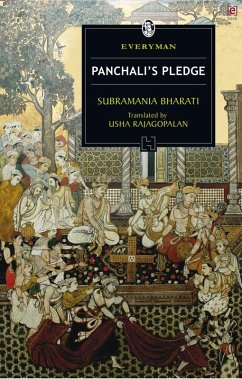Panchali's Pledge is the English translation of Bharati's seminal work, Panchali Sabadham, which reimagines the pivotal Game of Dice incident in the Mahabharata, where coerced into playing a game of dice by Duryodhana and Sakuni, Yudhisthira, the eldest of the Pandavas, stakes and loses his kingdom, his wealth, his brothers and finally Draupadi, leading to her disrobing and her rescue by the divine intervention of Lord Krishna. Enraged at the quiet indifference of those present in the assembly at her plight, Draupadi finally takes a pledge to avenge her ignominy with the blood of the Kauravas. Bharati wrote and published the first of the two-part minor epic in 1912 while living in the French territory of Pondicherry to escape British persecution. It was intended as a political allegory to the ongoing freedom movement and as an affirmation of the latent power in women. Usha Rajagopalan's translation seeks to complement what Bharati himself set out to do with the original text: to 'create an epic using simple phrases, a simple style, easily understood prosody and rhythm which the common man appreciates.'
Dieser Download kann aus rechtlichen Gründen nur mit Rechnungsadresse in A, B, BG, CY, CZ, D, DK, EW, E, FIN, F, GR, HR, H, IRL, I, LT, L, LR, M, NL, PL, P, R, S, SLO, SK ausgeliefert werden.









